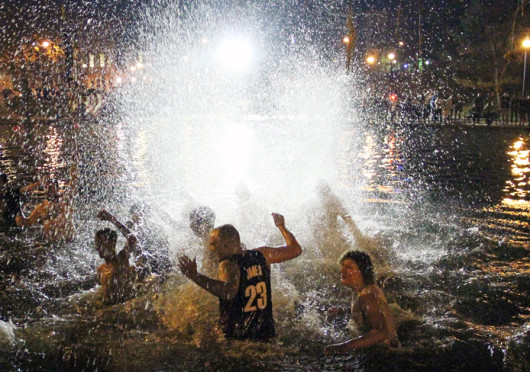
OSU students jump into Mirror Lake Nov. 20, 2012, as part of a Beat Michigan week tradition. This year’s jump is scheduled to take place Nov. 26.
Credit: Daniel Chi / For The Lantern
After the death of a former Ohio State student earlier this semester, some OSU officials are keeping mum about whether there will be additional enforcements in place at the Mirror Lake jump next week.
Tushar Shriram Kabre, age 28, died Sept. 19 at the Wexner Medical Center after being pulled from Mirror Lake Aug. 18 and placed in the Intensive Care Unit in critical condition. His cause of death was near drowning, but his manner of death is undetermined, Franklin County Coroner Jan Gorniak said.
OSU Administration and Planning spokeswoman Lindsay Komlanc said in an August email Kabre “received a master’s of science in chemistry degree in Autumn 2011” but he was not currently enrolled at the university.
About two months later, OSU officials have not said how they plan to handle enforcement at the Mirror Lake jump this year.
Jumping in Mirror Lake before the OSU football game against the University of Michigan is a university tradition, but it is not a university-sanctioned event. The Mirror Lake jump is set for Tuesday this year.
Despite the lack of university endorsement, there is typically an increased police presence in the area and lights are set up to illuminate the lake. Last year, representatives from University Police, Columbus Division of Police, the Franklin County Sheriff’s Office, the Ohio State Highway Patrol, Columbus Division of Fire, the Ohio Department of Natural Resources and MedCorp Mobile Medical Services were present at the jump.
OSU Student Life spokesman Dave Isaacs said, though, the university’s treatment of this year’s jump is still not nailed down.
“Any time such a tragic incident occurs, it will prompt renewed consideration of how we can best ensure safety and security. University leaders have been in conversation about how we can best ensure any activities, informal or organized, around Mirror Lake are as safe as possible,” Isaacs said Tuesday.
He would not provide further comment about whether this year’s handling of the event will be any different than in years past.
University Police Chief Paul Denton said Tuesday, however, the OSU Department of Public Safety’s efforts will likely be the same.
“In terms of our security efforts, we’ve always maintained a good security effort for (the Mirror Lake jump). There’s nothing we would do (any) different for (that) event in terms of police presence,” Denton said.
He added that public safety coverage will be “pretty typical.”
“If it occurs, we’ll be prepared certainly … We don’t really encourage people to participate,” he said. “We work it every year and move forward.”
Undergraduate Student Government President Taylor Stepp said OSU should not crack down on the jump any more than usual this year.
“Mirror Lake is a fantastic tradition. Students really enjoy jumping in the lake and celebrating the whole Beat Michigan culture,” he said. “I look forward to being able to defend students’ opportunities for being able to do that.”
He said there have been conversations this year about how to keep students safe, but those talks are not unusual.
“There’s always talks of what do we do on Mirror Lake (jump night) and how are we going to handle it. We’ve had conversations about it, but they’re not new,” Stepp said, adding that he believes appropriate actions will be taken to make sure there are “no more tragedies like the one in the fall.”
Some OSU students said people shouldn’t jump this year in order to honor Kabre.
“I know the Mirror Lake jump is a tradition and so I guess if they were to crack it down a lot of people would be very disappointed because, you know, they love jumping into Mirror Lake,” said Oby Ngene-Igwe, a third-year in biology who said she has never jumped in Mirror Lake. “But out of respect for the guy … we could just hold it off for this year and next year continue it.”
Others, though, said the tradition shouldn’t be altered since the incident was unrelated.
“I don’t think anything should be different because of that. Although it’s unfortunate, (it) didn’t happen on Mirror Lake jump night,” said Nick Noggle, a fourth-year in philosophy. “I don’t think it should affect that night just because, I mean, you’re capable of having an accident anywhere and drowning in any body of water.”
Noggle said he jumped his freshman year and has watched every year since.
Kayla Goddard, a fourth-year in communication and women’s studies, said she was “torn” about whether there should be more enforcement.
“(University officials) don’t want to take any responsibility for it or what the students do that night,” said Goddard, who has jumped the past two years. “(Having) more police involvement would kind of say that they’re supporting it, but then, you know, that’s a tragedy if that happened to a student.”
David Winterstein, a fourth-year in industrial and systems engineering who has never jumped, said what the university does or doesn’t do probably won’t impact whether or not students jump in the lake.
“For most students, they probably don’t see a relationship between that incident and what they’re going to do for the Michigan game. I think most students will probably make that decision independent of (Kabre’s death),” he said. “Probably regardless of what university officials do, I think students are going to do what they feel they should do.”
He said, though, safety should still be a priority in the way OSU handles the night.
“If there’s anything (OSU officials) can do to kind of help facilitate the safety of the event, I think that’s the best way to go,” Winterstein said. “If they kind of outlaw it, you’re going to get a response from students probably worse than what they originally would’ve done.”


